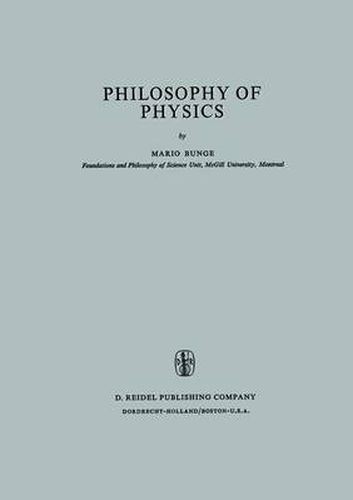Readings Newsletter
Become a Readings Member to make your shopping experience even easier.
Sign in or sign up for free!
You’re not far away from qualifying for FREE standard shipping within Australia
You’ve qualified for FREE standard shipping within Australia
The cart is loading…






This title is printed to order. This book may have been self-published. If so, we cannot guarantee the quality of the content. In the main most books will have gone through the editing process however some may not. We therefore suggest that you be aware of this before ordering this book. If in doubt check either the author or publisher’s details as we are unable to accept any returns unless they are faulty. Please contact us if you have any questions.
This book deals with some of the current issues in the philosophy, methodology and foundations of physics. Some such problems are: - Do mathematical formalisms interpret themselves or is it necessary to adjoin them interpretation assumptions, and if so how are these as sumptions to be framed? - What are physical theories about: physical systems or laboratory operations or both or neither? - How are the basic concepts of a theory to be introduced: by ref erence to measurements or by explicit definition or axiomatically? - What is the use ofaxiomatics in physics? - How are the various physical theories inter-related: like Chinese boxes or in more complex ways? - What is the role of analogy in the construction and in the inter pretation of physical theories? In particular, are classical analogues like those of particle and wave indispensable in quantum theories? - What is the role of the apparatus in quantum phenomena and what is the place of measurement theory in quantum mechanics? - How does a theory face experiment: single-handed or with the help of further theories? These and several other questions of the kind are met with by the research physicist, the physics teacher and the physics student in their everyday work. If dodged they will recur. And a wrong answer to them may obscure the understanding of what has been achieved and may even hamper further advancement. Philosophy, methodology and foundations, like rose bushes, are enjoyable when cultivated but become ugly and thorny when neglected.
$9.00 standard shipping within Australia
FREE standard shipping within Australia for orders over $100.00
Express & International shipping calculated at checkout
This title is printed to order. This book may have been self-published. If so, we cannot guarantee the quality of the content. In the main most books will have gone through the editing process however some may not. We therefore suggest that you be aware of this before ordering this book. If in doubt check either the author or publisher’s details as we are unable to accept any returns unless they are faulty. Please contact us if you have any questions.
This book deals with some of the current issues in the philosophy, methodology and foundations of physics. Some such problems are: - Do mathematical formalisms interpret themselves or is it necessary to adjoin them interpretation assumptions, and if so how are these as sumptions to be framed? - What are physical theories about: physical systems or laboratory operations or both or neither? - How are the basic concepts of a theory to be introduced: by ref erence to measurements or by explicit definition or axiomatically? - What is the use ofaxiomatics in physics? - How are the various physical theories inter-related: like Chinese boxes or in more complex ways? - What is the role of analogy in the construction and in the inter pretation of physical theories? In particular, are classical analogues like those of particle and wave indispensable in quantum theories? - What is the role of the apparatus in quantum phenomena and what is the place of measurement theory in quantum mechanics? - How does a theory face experiment: single-handed or with the help of further theories? These and several other questions of the kind are met with by the research physicist, the physics teacher and the physics student in their everyday work. If dodged they will recur. And a wrong answer to them may obscure the understanding of what has been achieved and may even hamper further advancement. Philosophy, methodology and foundations, like rose bushes, are enjoyable when cultivated but become ugly and thorny when neglected.